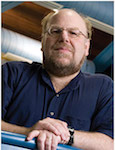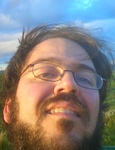Home | Attending | Programme | Call for Papers | Submissions | Organization
Invited Speakers
James Hendler, RPI, Friday 9th of October 2015 — On Beyond OWL: Real-world challenges for ontologies on the Web

James Hendler is the Director of the Institute for Data Exploration and Applications and the Tetherless World Professor of Computer, Web and Cognitive Sciences at the Rensselaer Polytechnic Institute (RPI). One of the originators of the “Semantic Web”, Hendler was the recipient of a 1995 Fulbright Foundation Fellowship, is a former member of the US Air Force Science Advisory Board, and is a Fellow of the American Association for Artificial Intelligence, the British Computer Society, the IEEE and the AAAS. Hendler has authored over 250 technical papers in the areas of Semantic Web, artificial intelligence, agent-based computing, open data systems and high performance processing.
Abstract: The need for ontologies in the real world is manifest and increasing. On the Web, ontologies are everywhere — but OWL isn’t. In this talk, I look at some of the things that are not in OWL, but which are needed for the use of OWL in many Web domains. This talk explores some of the needs for ontologies on the Web in data integration, emerging technologies, and linked data applications – and asks where the features needed for these are in OWL. The talk ends with some challenges to the OWL, and greater ontology, community needed to see more eventual use of standard ontologies on the Web.
Bijan Parsia, University of Manchester, Saturday 10th of October 2015 — Two Challenges for OWL

Bijan Parsia is a Reader in the School of Computer Science of The University of Manchester. His research interests are Semantic Web, Knowledge Representation and Reasoning, AI, Programming languages, Software and Ontology Engineering, HCI, Visualization, Belief Revision, Web services, and Planning. Among other projects, Bijan worked on the Swoop ontology editor as well as the Pellet reasoner while a Faculty Research Associate at the University of Maryland College Park. Bijan was the (co)founder of the OWLED workshop, which led to OWL 1.1 and subsequently to a second W3C OWL Working Group that led to OWL 2. Bijan co-edited several of the key OWL 2 documents.
Abstract: OWL (versions 1 and 2) are a success by many measures. The post standardisation infrastructure is world’s away improved. The use of OWL is broad and deep and has had a beneficial impact. And yet. OWL was developed as part of the Semantic Web vision and given that the Web itself has changed in many unanticipated ways it is, perhaps, not surprising that the early vision and the current reality are not fully aligned. Many same era technologies and world views have met similar fates (cf, XML) and the game is ongoing. Regardless of the ultimate trajectory of the (Semantic) Web, the OWL community is a living, breathing, thriving community centered around a technology which has paid off and promises more. So, what are the next steps we can and should take to continue to grow OWL? In this talk, I identify two key challenges, one socio-political and one technical. The socio-political challenge is how to advance the common infrastructure in the current standards landscape. The technical challenge is how to incorporate a useful notion of evidence into OWL. Conquering evidence, I shall argue, is likely the single biggest bang for the buck in terms of new features for OWL.
Workshop Programme
Friday, 9th of October 2015
8:30am – Breakfast / registration on site
9:15am – 9:30am – Opening
9:30am – 10:30am – SESSION 1: ONTOLOGY ENGINEERING I
– Simon Spero. Time And Relative Dimensions In Semantics: Is OWL Bigger On The Inside? [pdf]
– Adila A. Krisnadhi, Pascal Hitzler and Krzysztof Janowicz. On capabilities and limitations of OWL regarding typecasting and ontology design pattern views [pdf]
10:30am – 11:00am – Coffee Break
11:00am – 12:00am – SESSION 2: ONTOLOGY I
– Laura M. Daniele, Frank Den Hartog and Jasper Roes. How to Keep a Reference Ontology Relevant to the Industry: a Case Study from the Smart Home [pdf]
– Agnieszka Lawrynowicz and Ilona Ławniczak. Towards a Core Ontology of Occupational Safety and Health [pdf]
12:00pm – 1:00pm – Lunch Buffet
1:00pm – 2:00pm – KEYNOTE 1 – James Hendler. Beyond OWL: Real-world challenges for ontologies on the Web
2:00pm – 3:00pm – SESSION 3: TOOLS AND INFRASTRUCTURES I
– Alessandro Seganti, Pawel Kapłanski and Pawel Zarzycki. Collaborative editing of Ontologies using Fluent Editor and Ontorion [pdf]
– Luke Slater, Miguel Angel Garcia, Keiron O’Shea, Paul Schofield, Georgios Gkoutos and Robert Hoehndorf. Experiences with Aber-OWL, an ontology repository with OWL EL reasoning [pdf]
– Matthew Horridge and Mark Musen. Snap-SPARQL: A Java Framework for working with SPARQL and OWL [pdf]
3:00pm – 3:30pm – Coffee Break
3:30pm – 5:10pm – SESSION 4: ONTOLOGY II
– Mauro Dragoni, Paolo Busetta, Chiara Ghidini, Mauro Fruet and Matteo Pedrotti. An Ontology For Supporting The Evolution of Virtual Reality Scenarios [pdf]
– Perrine Pittet and Jerome Barthelemy. An Application Ontology to Help Users of a Geo-decision Software Understanding their Data [pdf]
– Larisa Soldatova, Pance Panov and Saso Dzeroski. Ontology Engineering: From an Art to a Craft – The Case of the Data Mining Ontologies [pdf]
– Raul Palma, Tomas Reznik, Miguel Esbri, Karel Charvat and Cezary Mazurek. An INSPIRE-based vocabulary for the publication of Agricultural Linked Data [pdf]
6:00pm – Discussion / announcements
Saturday, 10th of October 2015
8:30am – Breakfast / registration on site
9:00am – 10:15am – SESSION 4: REASONING
– Tahani Alsubait, Bijan Parsia and Uli Sattler. A similarity based approach to omission finding in ontologies [pdf]
– Doerthe Arndt, Ben De Meester, Pieter Bonte, Jeroen Schaballie, Jabran Bhatti, Wim Dereuddre, Ruben Verborgh, Femke Ongenae, Filip De Turck, Rik Van de Walle and Erik Mannens. Improving OWL RL reasoning in N3 by using specialized rules [pdf]
– Raghava Mutharaju, Prabhaker Mateti and Pascal Hitzler. Towards a Rule Based Distributed OWL Reasoning Framework [pdf]
10:15am – 10:45am – Coffee Break
10:45am – 11:15am – SESSION 5: TOOLS AND INFRASTRUCTURES II (1)
– Bijan Parsia, Tahani Alsubait, Jared Leo, Veronique Malaisé, Sophie Forge, Michelle Gregory and Andrew Allen. Lifting EMMeT to OWL Getting the Most from SKOS [pdf]
11:15am – 11:55am – Special Session on VOWL: Steffen Lohmann, Florian Haag and Stefan Negru. Towards a Visual Notation for OWL: A Short Summary of VOWL [pdf]
11:55am – 1:00pm – Lunch Buffet
1:00pm – 2:00pm – KEYNOTE 2 – Bijan Parsia. Two Challenges for OWL
2:00pm – 3:00pm – SESSION 6: ONTOLOGY ENGINEERING II
– Marek Dudas, Tomáš Hanzal, Vojtěch Svátek and Ondřej Zamazal. OBOWLMorph: Starting Ontology Development from PURO Background Models [pdf]
– Viachaslau Sazonau, Uli Sattler and Gavin Brown. General Terminology Induction in OWL [pdf]
3:00pm – 3:20pm – Coffee Break
3:20pm – 4:00pm – SESSION 5: TOOLS AND INFRASTRUCTURES II (2)
– Ernesto Jimenez-Ruiz, Alessandro Solimando, Terry Payne and Valentina Tamma. Avoiding Alignment-based Conservativity Violations through Dialogue [pdf]
– Marlo Souza, Alvaro Moreira, Renata Vieira and John-Jules Meyer. Integrating Ontology Negotiation and Agent Communication [pdf]
4:00pm – 5:30pm – OWL & Industry panel. Panel members:
- Mike Bennett (Hypercube)
- Peter Haase (metaphacts)
- Jodi Wachs (Cerner)
- Dave McComb (Semantic Arts)
5:30pm – 5:50pm – OWL Reasoner Evaluation (ORE) 2015 Competition Report – Rafael Gonçalves and Bijan Parsia
5:50pm – 6:00pm – Closing
